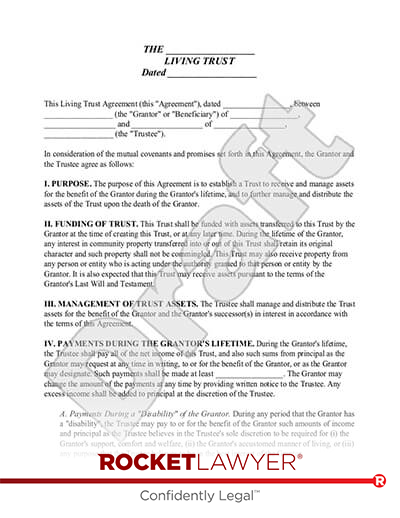Upon your death, the successor trustee begins the process of carrying out the terms of your Living Trust that provide for distributions to your beneficiaries. This process includes appointing the successor trustee, resolving challenges to the trust, obtaining a federal identification number, and opening a checking account in the trust's name. Unlike wills, there is no requirement to provide notice to heirs, beneficiaries, and creditors for living trusts.
Trustee Duties
- Gathering Assets: The first substantial task of the successor trustee is to review the assets owned by the trust and collect any additional assets that may flow into the trust. This process includes reviewing records, submitting your pour over will to probate (if necessary), taking physical custody of trust assets, and valuing the property. Unlike the probate process used in carrying out the terms of a will, it is not necessary to file an inventory listing for a living trust.
- Payment of Debts and Expenses: Before making distributions to the beneficiaries, the successor trustee must also determine what debts and expenses should be paid. The successor trustee is also responsible for resolving claims, successor trustee fees, attorney fees, filing death tax returns, and filing other tax returns. To pay these costs, it may be necessary for the successor trustee to liquidate assets. This authority is generally given to the trustee in the living trust.
- Distribution of Assets: After the debts and expenses, including taxes, have been paid, the successor trustee needs to make proper distribution of the remaining assets. This is done through distributions to beneficiaries and establishing trust shares.
- Terminating the Trust: After the successor trustee has completed distributions of the trust assets in accordance with the terms of the living trust, the trust can be terminated. Unlike the probate process, the successor trustee is not required to file a final report with the probate court. However, it is appropriate for the successor trustee to provide a final accounting to the trust beneficiaries to show that the trust assets were distributed properly.
Many living trusts have trust shares that continue beyond the grantor's death to provide for spouses, children, and others. If that is the case, the termination of the trust will not occur at the time of the grantor's death. Rather, the termination will occur in accordance with the provisions of the trust shares. For example, the trust may continue until the death of a spouse or until children reach a specified age.
Please note: This page offers general legal information, not but not legal advice tailored for your specific legal situation. Rocket Lawyer Incorporated isn't a law firm or a substitute for one. For further information on this topic, you can Ask a Legal Pro.
